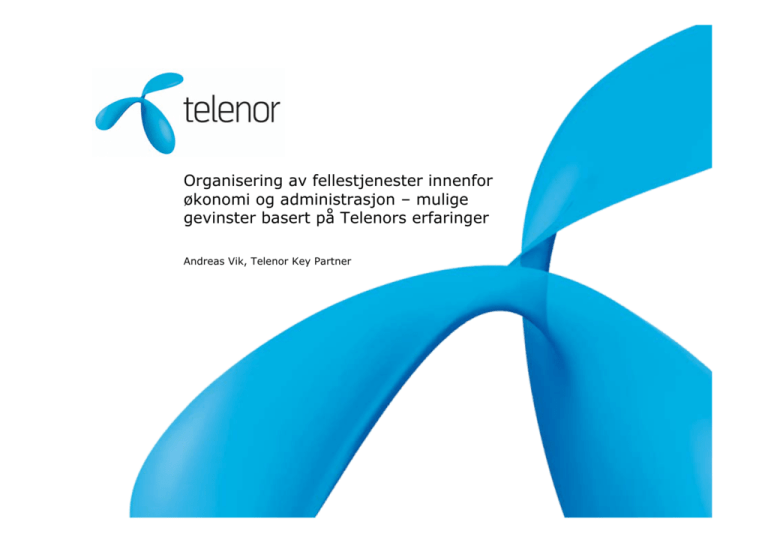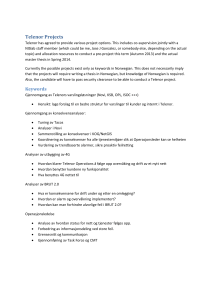Why shared services?
advertisement

Organisering av fellestjenester innenfor økonomi og administrasjon – mulige gevinster basert på Telenors erfaringer Andreas Vik, Telenor Key Partner Agenda • Brief presentation of Telenor • Shared services in Telenor • Why shared services? • Experiences from shared services Telenor facts • One of the world’s largest mobile operators with 105 mill. mobile subscriptions* • Norway’s leading telecommunications company • Largest provider of TV services to the Nordic market • Our largest consolidated mobile operations: – Kyivstar, Ukraine 17.7 mill subscriptions – DTAC, Thailand 11.2 mill – GrameenPhone, Bangladesh 9.4 mill – DiGi, Malaysia 5.6 mill – Telenor, Pakistan 4.6 mill – Pannon, Hungary 3.0 mill – Telenor, Norway 2.7 mill • Total workforce: 33,250 man-years (22,500 outside Norway) • Market value as of 26 October 2006: NOK 162 billion • * 100% figures - all companies per Q3 2006 Telenor’s mobile world Norway Telenor 100% Denmark Sonofon 100% Sweden Telenor 100% Hungary Pannon 100% Montenegro Promonte 100% Serbia Telenor Austria One Pakistan Telenor Pakistan 100% 100% Ukraine Kyivstar 17.5% Russia VimpelCom 56.5% 29.9% Bangladesh GrameenPhone 62.0% Thailand DTAC 73.1% (*) Malaysia DiGi 61.0% *Economic exposure Telenor - High level development 1995 2000 DOT COM Trends: 2004 RESTRUCTURING •Deregulation •Competition •Majority ownership •Growth •Cost focus •International focus •Decentralization •Standardization •Synergies across global operations 99: Merger with Telia called off 05: Common values •”Dot com” Events: INDUSTRIALIZATION 95: Telenor brand launched 00: Telenor public company 98: Last parts of monopoly ended 02: Fredrik Baksaas new CEO 02: Delta 4 02: New HQ Fornebu 05: More than 50% of employees outside Norway 06: Global coordination part of corporate management board 06: Common brand Agenda • Brief presentation of Telenor • Shared services in Telenor • Why shared services? • Experiences from shared services About Telenor Key Partner AS • TKP is: – Telenor’s shared service center organized as a separate legal entity. TKP was created in 2001, however significantly expanded during 2002-2004 as a part of Delta 4 • Services: • Mission statement: – – – – • 284 Revenues: – • 80 legal entities in Norway, Sweden, Denmark, Finland, Pakistan, and Hungary Employees: – • Telenor Key Partner is a professional supplier of technology based administrative services. In professional partnership with customers and the Telenor group TKP creates efficient work process, delivers high quality services, and produces cost efficient services. Customers: – • Finance Payroll & HR Procurement (transactional/non strategic) 270 MNOK (2006), SLA’s and transaction based price model Offices: – Oslo, Bodø, Kristiansand, Aalborg og Islamabad Finance Telenor in Norway 2001 Quantitative • Total operating costs: 394 mill NOK –~50 % = personnel cost –~50 % = IT-system costs, consultants, other operating costs • 461 full-time equivalent are directly related to the financial area • Time spent per work process: – ~63 % = accounts/ transactions handling and reporting –~17 % = analysis/ controlling –~13 % = budget/business partner Qualitative • Different financial systems (Oracle, Visma, Concorde, Agresso, FS, Ergosoft) • 30 financial-databases (installations) • 8 different systems for reporting (ER, Blink, Gentia, Cognos, Business Objects etc.) • Several different scanning systems • Many reporting layers (4–5) • Ca. 35 accounting units • Ca. 40 reporting units • There is limited integration between the finance functions within some of the Business Area • Extensive manual processes, e.g. intercompany and reporting • Different chart of accounts (6– 7) Development TKP Year-by-year • 2001 – Startup and 22 business areas • 2002 – Central organization • 2003/04 – Restructuring • 2005 – International customers • 2006 – New business areas Development FTEs 300 250 200 150 100 50 0 2001 2002 2003 2004 2005 2006 Agenda • Brief presentation of Telenor • Shared services in Telenor • Why shared services? • Experiences from shared services Why Shared Services? Improve service, quality, accuracy, and timeliness 86 % 85 % Reduce cost 74 % Standardise services Group similar tasks and expertise for a critical mass 70 % Reduce headcount and wages 69 % 56 % Corportate strategy 0% 20 % 40 % 60 % 80 % Source: Hackett Group - Forth Annual European Finance SSO Study 2005 100 % Rationale for establishing SSC in Telenor Improvements: VALUE TIME & QUALITY COST Strategic themes: Implementing lasting change: Better decisions Quality improvement Process automation Re-use Standardisation Technology Requirements/ Vision Information architecture Process/ Organisation Effects implementing SSC finance in Telenor Reduced OPEX: 134,6 MNOK = 34% Quality improvements • Invoices paid on time: 70% in 2002, 96% in 2005 394 • Financial statements reported to group within deadlines from 70% in 2002 to 100% in 2005 259,4 2001 • 100% reconciliation of P&L and balance accounts between payroll and accounting 2004 Reduced FTEs: 111 FTEs = 24% 6 275 214 186 Baseline Payback time = 2 years! Out of scope FTE BU 135 2005 • Auditors signature on “kontrolloppgaver” for all companies FTE SSC Value-adding finance function Old focus Optimize your potential through SSC and self service solutions Decision support Analysis Business Control Handling: • Transactions • Data Change of behaviour New focus Decision support Analysis Business Control Redesign Handling: Transactions Data Agenda • Brief presentation of Telenor • Shared services in Telenor • Why shared services? • Experiences from shared services Best Practices for shared service performance* 0% 10 % 20 % 30 % 40 % 50 % EDI with banks for invoices, travel and expenses etc 43 % Global standard chart of accounts 43 % 42 % End-to-end process ownership 30 % Measurement intensive KPI reporting Extensive training for SSO staff 23 % Independance of SSO 23 % 13 % Self-services 11 % Global standard cost center hierachy Call center 70 % 66 % One single integrated ERP platform Metriality thresholds as balance of risk and effort 60 % 5% 2% *Source: Hackett Group - Forth Annual European Finance SSO Study 2005 Pricing strategies Telenor experience Fixed Cost based Commercial structure and scenarios Variable Fixed Market price Variable • “One price” policy assures that no time is spent discussing prices with each customer • Service prices exposes the cost structure of the services • Transaction based pricing gives good incentives to reduce volumes • Annual benchmarks assures that prices are “in line” with market prices Governance struktur TKP Forum Mandat Styre TKP •Øverste myndighet i TKP •Fastsette priser •Større investeringsbeslutninger •Fastsette budsjett •Økonomisk oppfølging TKP AS •Godkjenne strategi Brukerstyre pr område •Sikre at SSC Ø leverer faglig forsvarlig leveranser i tråd med SLA, særlig grensesnittet SSC, GF og kunde. •Oppfølging av KPI’er •Oppfølging av benchmark •Uttalelsesrett ved prisendringer •Anbefale felles tiltak/investeringer/ prosjekter for å øke nytte/ effektivitet i verdikjedene til SSC. PF ERP •Utarbeide systemstrategi innenfor ERP-området •Godkjenning av større systemendringer (3 PI) •Control owner GCC •Eskaleringspunkt ved kritiske feilsituasjoner Kundeteam •Service rapportering med avvik på avtalte leveranser og operasjonelle KPI’er •Diskutere kundespesifikke behov, evt beslutte kundespesifikke endringer •Oppfølging operative saker Høynivå ansvarsfordeling SSC/CFO Teknisk regnskap •Regnskapsprosessering: −Inn- og, utgående faktura −Inn- og utbetalinger −Bilagsregistreing/ transaksjonshåndtering −Delt ansvar avstemminger −Teknisk rapportering Reviderbart regnskap •Letter of Comfort til selskapene •Kontroll av dokumentasjon: −ADI-bilag −ADI-bilags linjer (stikkprøve) −Skattesensitive konti •Kontroll av moms •Felles lagring av dokumentasjon •Proaktiv rapportering til kunden ved avvik •Avstemmingsansvar alle balansekonti •Letter of Representation to group •Kontroll av fullstendighet •Vurderingsposter (non-routine transactions) •Rimelighetsvurderinger •Subsequent events •Contingent liabilities Fullstendig rapporterte regnskap SLA’ene er kritisk for å definere ansvarfordelingen mellom SSC og kunde HR SSC – Delivery model Delivery model that is adaptable to local requirements. HR SSC deliverables Services description • Global Process management Transactional Services System delivery • Process support Support / helpdesk HR Process management • Process and roll out concept change control • Services delivered to HR Norway (as is). Will be handled by Local HR in Pannon –Personnel administration –Learning, Recruitment, Time, Travel expences etc • System availability and 2’line system support • Data maintenance Single Point of contact / 2. Line helpdesk Pit falls in implementing SSC Poor service quality 79 % IT problems 56 % Little employee support Business activities are interrupted during implementation High implementation cost Complexity increase for planning and reporting form service charging and pricing 41 % 28 % 26 % 19 % 0 % 20 % 40 % 60 % 80 % 100 % Source: Hackett Group - Forth Annual European Finance SSO Study 2005 Telenor experience • Implementing SSC is a though process involving people. Headcount reduction must be made in order to reap the cost advantages. • Growth is important to make up for effects of continuous improvements • One size does NOT always fit all • Customers might retain some additional capacity until SSC has proven successful thank you
